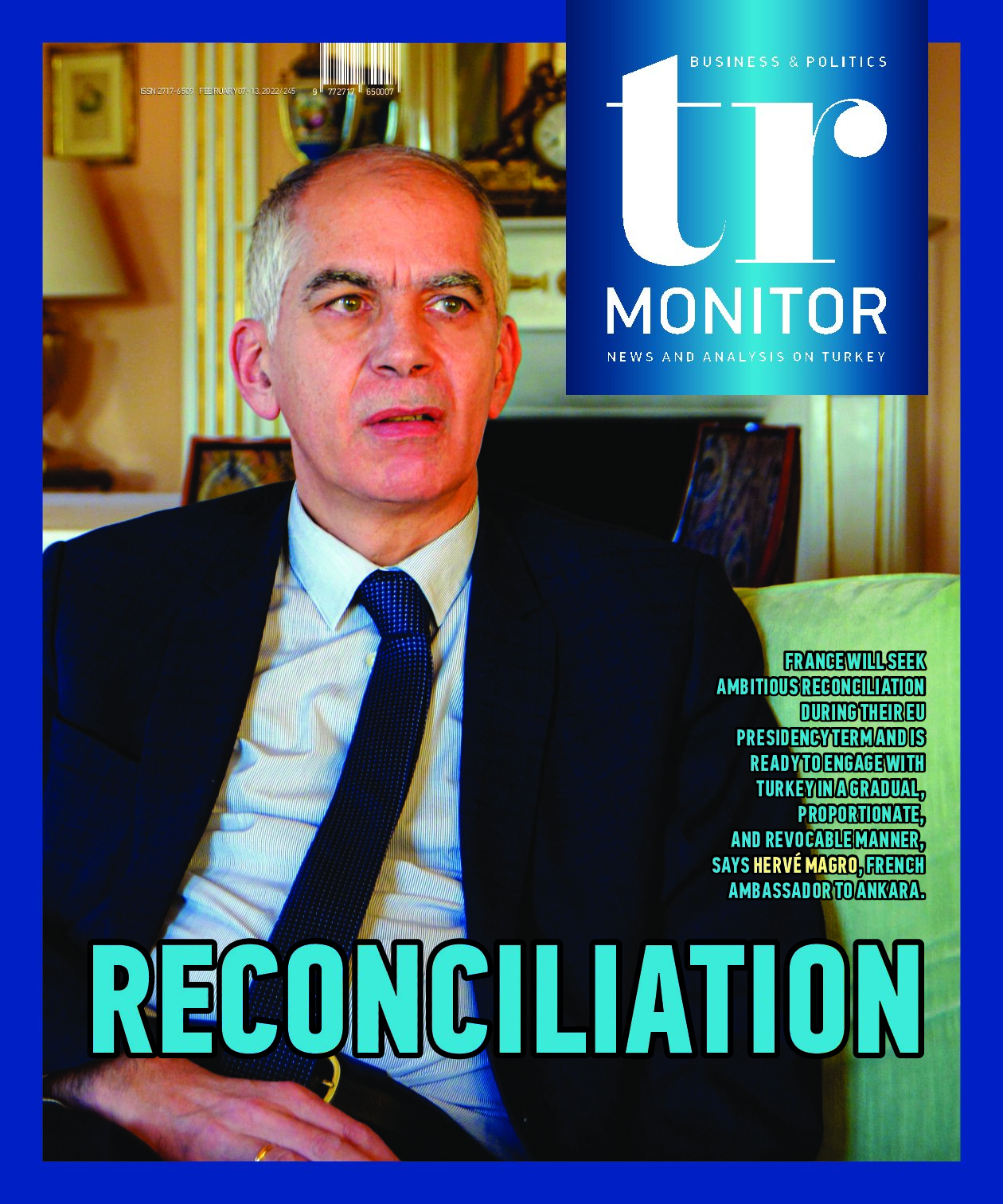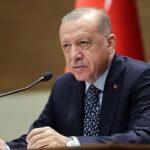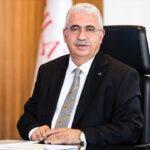By MARUF BUZCUGIL
France is ready to engage with Turkey in a gradual, proportionate, and revocable manner in several areas of common interest, subject to established conditions, according to French Ambassador to Ankara Hervé Magro. Hinting at the policies that France will follow during the European Union Presidency it has assumed since January 1, Magro stated that they will seek ambitious reconciliation during their presidency.
Much has been done since the European Green Deal was presented by the European Commission in December 2019. The Commission proposed the first European Climate Law, transforming the 2050 climate neutrality target into binding legislation, to make the European Union the first carbon-neutral continent in March 2020. The target to reduce net emissions by at least 55% by 2030 was later endorsed by European leaders in December 2020. This was also integrated into the European Climate Law, which came into force in June 2021, following an agreement between the European Council and the European Parliament.
Since then, the EU has been working on revising its legislation on climate, energy, and transport under the package called ‘Fit for 55’, to align existing laws with the 2030 and 2050 targets. This package includes – but is not limited to – different legislative proposals and policy initiatives covering a variety of areas such as The EU Emissions Trading System (ETS), member states’ emissions reduction targets, renewable energy, energy efficiency, energy taxation, and the Carbon Border Adjustment Mechanism (CBAM) to address carbon leakage in a World Trade Organization (WTO) compliant manner.
The French Presidency of the Council of the European Union will advance negotiations on this package, seeking to reach an ambitious compromise between member states, the ambassador said. The French Presidency will continue to call for urgent action on biodiversity at both the European and global level (COP15) in line with the Green Deal, he added. “It will also promote the transformation of the European economic model to make it sustainable and resilient, and the transition to a healthier environment,” he said.
As a reminder, EU taxonomy refers to the classification of economic activities that have a positive impact on the environment and aims to direct and mobilize investments in activities needed to achieve the goals the ambassador mentioned earlier.
The implementation process of the taxonomy decrees continues. Since the first decree, issued in July 2021, was partial, a draft additional decree was proposed by the Commission on December 31, which also includes nuclear and natural gas and sets environmentally ambitious compliance requirements.
“It seems important to France that EU taxonomy encourages decarbonization of the energy mix so that all member states’ efforts are directed towards common European climate goals,” Magro said. Thus, the proposed version offers solutions that France finds satisfactory, but the text needs clarification at certain points to adequately secure these goals, he added.
“After the publication of the final text by the Commission, the European Parliament and the European Council will have the opportunity to object for four months. We’ll look and see,” he said.
Turkey’s Green Deal efforts to be encouraged
Commenting on the Turkey-EU relations during the French term presidency, Magro said his presidency will ensure the implementation of EU Council decisions on EU-Turkey relations. “We are ready to engage with Turkey in a gradual, proportionate, and revocable manner in several areas of common interest, subject to established conditionals.”
Climate is one of these areas, he emphasized. “We understand that many of our priorities will have implications for Turkey, and we can only encourage our Turkish friends and partners to continue their efforts to align with Europe’s Green Deal,” he said.
The Paris Agreement, the first binding international agreement covering climate change, the most important global problem of our time, is, therefore, a historic agreement, the ambassador underlined. “In this context, there has been a striking acceleration in Turkey’s climate agenda since last summer and since the publication of the Green Deal Action Plan. I am very glad that the Parliament unanimously approved the Paris Agreement last October. This is an important step forward,” he said.
To him, Turkey’s decision to become carbon neutral by 2053 is ambitious but France is ready to give its support, both financially and technically, to achieve this goal. Financially, together with the World Bank and Germany, France is part of the Climate Memorandum of Understanding signed with Turkey last October. France has committed to providing financing of EUR 800m of a total of nearly USD 3.2bn guaranteed for the next three years. “Technically speaking, French companies are known for their know-how, including mitigation and adaptation. I even noticed at the last JETCO meeting in September that Turkish companies are willing to partner with them in this area,” he said repeating what Trade Minister Franck Reister previously said: “The French Government is ready to financially support such cooperation for a win-win relationship, where needed and whenever conditions are met.”
Sustainable cities and technology promising
Bilateral trade relations have proven to be very resilient in 2020 despite the pandemic, according to Magro. “The first figures for 2021 are also very encouraging and show a recovery compared to 2020,” he said, adding that France and Turkey can do more. Identifying new areas of cooperation and creating the right business environment are essential not only to strengthen trade relations but also to encourage bilateral investments, he said.
Magro sees JETCO (Turkey-France Joint Economic and Trade Commission) as the right place to discuss these issues. This is where the Embassy is most involved: preparing JETCO meetings and following up on the decisions taken in this context. “There are four working groups within JETCO that focus on areas that we mutually consider very promising for our bilateral cooperation: Agriculture, Energy, Urbanism – Environment and Transport,” he said. He thinks there are two dimensions in which these groups can work in particular: “Sustainable cities in line with our common goal of tackling climate change, and the ‘technology sector,’ as digital technology can accelerate our goals in this area,” he explained.
Opportunity for European-African alliance: EU-AU Summit
The EU-African Union Summit to be held on February 17-18 will be a defining moment for the French Presidency of the EU and Europe more broadly, according to Hervé Magro, Ambassador of France to Ankara. “At the economic level, one of the challenges is to identify concrete projects that the EU can also fund, especially with their African partners, that contribute to the inclusive and sustainable economic development of African economies and regional integration,” he said.
“All actors in Africa can play a positive role in helping this continent in meeting the challenges we have mentioned. It is natural to compete in the economic field, where we can also consider joint projects, but it is in our common interest to limit this competition to this field. We must act together and in close contact with our African partners in these countries, to move towards common goals, especially in the areas of development and security,” he added.
Born in Ankara
Herve Magro, French Ambassador to Ankara, has a very special position among diplomats. He was born in Ankara on December 30, 1960, and lived here until he was 14 years old. He started his diplomatic life and his first overseas assignment in Ankara, where he was appointed as a press consultant in 1988. He previously served as the Consul General in Istanbul and this is his third assignment in Turkey. Because he spent his childhood here, he can speak fluent Turkish.










